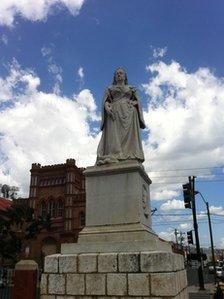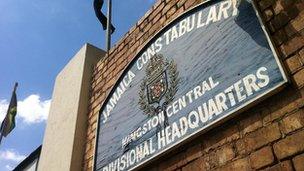Jamaica debates republic option
- Published

More than 300 years of British rule over Jamaica ended in 1962
Prince Harry is set to visit Jamaica on Monday as part of the Queen's Jubilee celebrations.
But while he is likely to get a warm welcome, he will also find himself in the middle of a debate over whether Jamaica should replace the Queen as head of state and become a republic.
If and when it does, it would signal a break with long-held ties to the British monarchy.
Situated in a central park in Kingston, the island's capital, is a statue of Queen Victoria - one of the many symbols of Jamaica's colonial past.
It was at midnight on 5 August, 1962, that the union jack was lowered and the black, gold and green of Jamaica rose for the first time, ending 307 years of British rule.
Fifty years on, Jamaica is getting ready for the arrival of the Queen's grandson. Workers have been putting a fresh lick of paint on the governor-general's residence, King's House, and the gardens are getting manicured.
'Circle of independence'
But it was here, only two months ago, that Jamaica's newly-elected Prime Minister, Portia Simpson-Miller, made a pledge to remove the Queen as head of state.
"We need to complete the circle of independence. In this regard we will initiate the process of our detachment from the monarchy to become a republic with our own indigenous head of state," she said in her inaugural address.
This is not the first time this issue has been raised by Jamaica's leaders, but there now seems to be the political will to make it happen.
During campaigning for December's election, constitutional change was one of the only issues that the two main parties, the People's National Party (PNP) and the Jamaican Labour Party (JLP), agreed on.
The first stage of reform will need the support of both sides to get through parliament and the senate, and the conversations have already started.
"We respect Britain. The British people shouldn't take this as any kind of slight," said Justice Minister Mark Golding.
"It's not about that, it's about a country coming of age and wanting to repatriate its sovereignty - and that's the path we're all on."
With the backing of the political parties, the second stage would see the public voting in a referendum.
That vote would need a three-fifths majority of the electorate to see the end of the monarchy.
Visa issues
And some say if passed it could lead to calls for constitutional reform in other former colonies.
"In other Caribbean countries it would be a stimulus to the consideration of this," says Dr Lloyd Barnett, a constitutional lawyer in Kingston.
He notes that there are three Commonwealth nations in the region that are already republics: Guyana, Trinidad and Tobago, and Dominica.
"We have had fairly similar constitutional historical developments so there is a likelihood that changes will again occur."
Jamaicans' links to the "mother country" are not as strong as they used to be, but there are those who wish the island had stayed a colony.
A survey last year showed surprising results: 60% of those canvassed believed Jamaica would be better off today if it remained a British colony, against 16% who thought they would be worse off.
"It was something that surprised a lot of people here in Jamaica and around the world given the fact that Jamaicans are such a proud people," said Bill Johnson, a Jamaica-based pollster.

Royal insignia adorn many official groups
"Where they hear stories about the Turks and Caicos, Cayman and Bermuda remaining colonies, they think what benefit do we get of being independent, apart from we need visas to go to the UK."
But with Jamaica battling with high unemployment and a debt burden that is 130% of GDP at nearly $18bn, some wonder if becoming a republic should be a priority.
Royal insignia are found the uniforms of soldiers and the police, and on some government buildings. Replacing them all would cost.
"Add up all of this stuff and it'll cost millions and millions of Jamaican dollars... think about what can be done in terms of healthcare, security, crime reduction with that money," says Merrick Needham, a Jamaican etiquette and protocol expert.
Death penalty
The government says that the process of becoming a republic could take less than a year.
For her part, the Queen has only offered a brief statement via Buckingham Palace on plans to remove her, saying the issue is "entirely the matter of the Jamaican government and people".
Over the years, the Queen has made many visits to this country. As Prince Harry starts his first royal tour on her behalf, it could be the last with his grandmother as head of state of Jamaica.
The Jamaican government also wants to take full control of the island's legal system. The final court of appeal under the existing constitution is the judicial committee of the Privy Council, based in London.
The prime minister has vowed to make the Caribbean Court of Justice in Trinidad the highest court of appeal, ending a system that dates back to the colonial era.
With high murder rates, many people in the country are in favour of the death penalty, but attempts to carry out the sentence have failed when challenged in London.